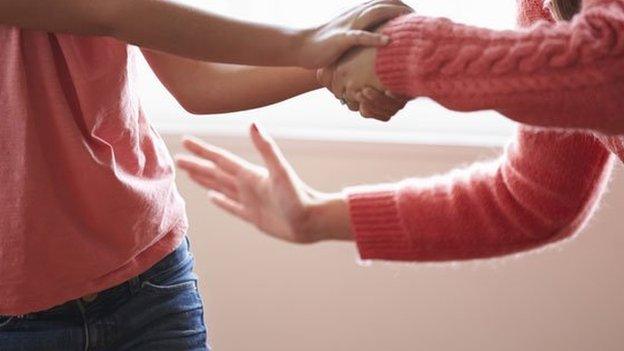Smacking children 'creates cycle of violence'
- Published

The use of physical punishment has declined in recent years - although the report said it was still common
Academics have called for a ban on smacking, external after finding "compelling" evidence that it creates a "vicious circle" of conflict and violence that carries on into adulthood.
The researchers, commissioned by Scots charities, examined 74 studies done across the world in the past decade.
They concluded that smacking was associated with increased childhood aggression and antisocial behaviour.
There was also a "worrying risk" of escalation into physical abuse.
The report was commissioned by leading children's charities in Scotland, as well as the country's Children's Commissioner, and compiled by academics at University College London.
It found that in many countries, including the UK, the use of physical punishment was declining - although the decline had been quicker in many of the 47 countries that have already outlawed smacking.
Negative effects
It also found that public attitudes had shifted, with the use of physical punishment becoming less and less acceptable and a high proportion of parents doubting its usefulness.
But it said physical punishment was still common in Scotland and the UK, despite its negative effects being known and the fact that it "constitutes a clear violation of children's human rights".
Among the key findings of the report were:
A link between physical punishment and childhood aggression, antisocial behaviour and delinquency.
An association between physical punishment and child maltreatment or abuse.
Physical punishment makes it more likely children will misbehave, leading to a "vicious circle of cascading conflict".
Childhood physical punishment is linked to adult aggression and antisocial behaviour, including sexual violence.
Physical punishment is related to depressive symptoms and anxiety among children.
There is also some less consistent evidence for links with depressive symptoms and reduced self-esteem in later life.
Physical punishment can lead to an increased risk of parent-child conflict, adult mental illness and adult substance abuse.
The report concluded: "The evidence for harmful effects of physical punishment is strong and consistent, and the declines in the use of physical punishment in countries where it is prohibited make a compelling case for the introduction of such legislation.
"The current laws across the UK allowing physical punishment of children in the home and in private foster care should be challenged from both a human rights and a child wellbeing perspective.
"The international human rights consensus on physical punishment is clear: repeated examinations of UK laws have stated in unequivocal terms the imperative of legal reform to protect all children against all forms of physical punishment in all settings."
'Reasonable chastisement'
Earlier this year, a United Nations report called on the UK to "put an end to corporal punishment in all settings" and encourage non-violent forms of discipline instead.
Parents in England and Wales are currently allowed to use "reasonable chastisement", although criminal charges can result from any punishment that leaves a mark such as bruising, swelling, cuts or scratches.
In Scotland, it is illegal to hit children on the head, shake them or punish them with a belt, cane of other implement.
Both the Scottish and UK governments have said they do not wish to criminalise parents who "lightly" smack their children. A bid to outlaw smacking in Wales was rejected by the Welsh Assembly last month.
The researchers said that this position "contradicts the evidence base that physical punishment carries a serious risk of escalation into injurious abuse".